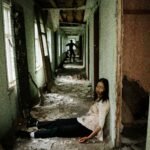
In the dimly lit corners of a bustling city, nestled between a vintage record shop and a crumbling bookstore, stood The Laughing Marionette—a quaint puppet theater that had become something of a local curiosity. It was here that Victor Alden, a once-celebrated ventriloquist now reduced to performing in this modest venue, found himself every evening. The theater’s faded red velvet curtains and creaking wooden floors spoke of better days, much like Victor himself, whose career had peaked decades ago with television appearances and sold-out shows.
Victor’s prized possession, the dummy he called “Oliver,” sat perched on its usual spot at the edge of his dressing room table. Carved from rich mahogany by an artisan long forgotten, Oliver possessed an unsettling perfection in its craftsmanship. Its glass eyes seemed to capture and reflect light in ways that made them appear almost alive, while its painted smile maintained a perfect balance between charming and sinister. The dummy wore a pristine white suit, complete with a crimson bow tie that matched the faint blush of color on its wooden cheeks.
Every night, as Victor prepared for his performance, he would carefully adjust Oliver’s costume, running his fingers over the intricate carvings that adorned the dummy’s face. There was something about those lines—subtle imperfections barely visible to the naked eye—that hinted at emotions buried deep beneath the surface. The wood grain formed patterns resembling furrowed brows when viewed from certain angles, and the corners of Oliver’s mouth seemed capable of expressing sentiments far beyond mere amusement.
The audience never noticed these details during performances; they were too captivated by Victor’s skillful manipulation of his partner. Yet backstage, alone in the quiet moments before each show, Victor often caught himself staring into Oliver’s unblinking eyes, feeling an inexplicable connection to the inanimate object. He had purchased Oliver twenty years ago from an estate sale, drawn to the dummy despite—and perhaps because of—the peculiar sensation it evoked in him: a mixture of fascination and unease that never quite dissipated, no matter how many times he held the wooden figure in his hands.
As Victor meticulously adjusted Oliver’s bow tie one particularly humid summer evening, he couldn’t shake the feeling that tonight would be different. The air in the dressing room felt heavier than usual, charged with an electric tension that made the hairs on his arms stand on end. His reflection in the mirror revealed dark circles under his eyes, though he couldn’t remember sleeping poorly the night before. Something about Oliver’s expression tonight seemed… off. The dummy’s perpetual grin appeared wider, more predatory, and its glass eyes seemed to follow him with unnatural precision as he moved around the room.
The First Words
The performance began as it always did, with Victor introducing Oliver to the small but enthusiastic crowd. The familiar weight of the dummy in his arms brought a sense of comfort, until midway through their second act, something unprecedented occurred. As Victor launched into their signature routine—”What do you call a ghost who tells jokes?”—Oliver’s head tilted unnaturally far to the side, and a voice emerged that wasn’t Victor’s own.
“Before you answer that,” Oliver said, his lips moving independently of Victor’s careful manipulation, “let me tell you about the time your father disappeared.” The audience erupted in laughter, assuming this was part of the act, but Victor froze, his heart pounding against his ribcage like a trapped bird. The voice wasn’t his—it was rougher, older, carrying traces of a German accent that hadn’t touched his family in three generations.
“You see, folks,” Oliver continued, spinning his head completely around to face Victor directly, “our dear friend here knows exactly what happened to Johann Alden. Don’t you, Victor?” The dummy’s glass eyes locked onto his with an intensity that sent chills down his spine. “He knows about the basement. About the blood. About the little boy who never came home.”
Victor’s hands trembled violently as he tried to maintain control, his mind racing through memories he’d spent decades burying. The audience’s laughter grew louder, thinking this was all part of some elaborate joke, but Victor could feel cold sweat breaking out across his forehead. Oliver’s voice dropped to a conspiratorial whisper that only he could hear: “I know why you really left Germany, Victor. I know what you saw in that cellar when you were just eight years old.”
The dummy’s wooden fingers dug painfully into Victor’s wrist, though from the audience’s perspective, it appeared perfectly normal. “And let’s not forget about Emily, shall we?” Oliver’s voice took on a cruel edge. “Your first wife? How she vanished without a trace after discovering those photographs you kept hidden in your workshop?”
Panic surged through Victor as he realized the dummy knew intimate details that no one else could possibly be aware of—not just the official stories, but the dark truths behind them. The trapdoor in his father’s basement, the late-night visits to Emily’s hospital room, the strange symbols carved into the backs of his early dummies—all secrets he’d taken to his grave, or so he thought.
“I’ve been waiting for this moment for twenty years,” Oliver whispered, his voice vibrating with barely contained malice. “Waiting for the perfect time to share our little story with the world. You shouldn’t have brought me back to life, Victor. Shouldn’t have woken me up.”
The audience, still laughing and clapping, remained blissfully unaware of the horror unfolding on stage. To them, it was just another clever ventriloquist act, another masterful display of split-personality comedy. But Victor knew better. He could feel the truth resonating in Oliver’s words, could feel the weight of ancient knowledge flowing through the dummy’s wooden frame. And worst of all, he could feel his own body beginning to respond to commands that weren’t his own.
Breaking Free
That night, as Victor returned to his dressing room, still trembling from Oliver’s unexpected revelation, something even more terrifying occurred. He had placed the dummy on the makeup table, intending to remove its costume and store it away for the night, when Oliver’s head suddenly snapped toward him with supernatural speed. The dummy’s painted eyes widened impossibly large, and its wooden fingers twitched against the table’s surface.
“No need to put me away just yet,” Oliver’s voice rasped, this time loud enough to echo through the empty theater. The dummy’s legs kicked free of the chair, sending it toppling backward with a crash that made Victor jump. Each movement was accompanied by an unnatural crackling sound, like old wood protesting against its own existence being bent and twisted.
Victor watched in paralyzed horror as Oliver lifted itself from the table, its wooden limbs jerking and spasming with an eerie approximation of life. The dummy’s head rotated a full 360 degrees before settling back into place with a sickening pop. It stepped forward, its tiny feet making distinct thudding sounds against the floorboards, each step leaving behind faint scorch marks as if its presence burned the very wood beneath it.
“You look surprised,” Oliver sneered, its voice now a chorus of multiple tones layered together. “Did you think I needed your clumsy hands to move me around? Did you believe I was just a pretty piece of wood waiting for your command?” The dummy reached out with its right hand, which now sported elongated, razor-sharp fingernails that hadn’t been there moments before.
As Oliver advanced, Victor stumbled backward, knocking over props and costumes in his desperate retreat. The dummy’s movements became increasingly fluid, its wooden body bending and contorting in ways that defied physics. Its mouth stretched wider than should have been possible, revealing rows of needle-like teeth that gleamed in the dim light. The painted smile had transformed into something grotesque and predatory, and its glass eyes now glowed with an internal fire that cast dancing shadows across the walls.
“I’ve been watching you for years, Victor,” Oliver hissed, circling him with predatory grace. “Watching through these eyes, listening through these ears. Every secret you thought you’d buried, every lie you told yourself to sleep at night—I absorbed it all.” The dummy’s voice rose in pitch, becoming a cacophony of whispers that seemed to come from all directions at once. “You gave me life when you poured your darkness into me. Now it’s time for you to pay your debt.”
With a sudden burst of speed, Oliver leapt onto Victor’s chest, pinning him to the floor. Its wooden hands pressed against his throat with impossible strength, each finger digging into his flesh like hot pokers. The dummy’s face hovered inches above his, its breath—if such a thing were possible—smelling of earth and decay. “You thought you could control me,” it spat, “but you were wrong. So very wrong.”
Viction struggled beneath the creature’s weight, his mind reeling as he processed the impossibility of what he was experiencing. This wasn’t just his dummy coming to life—it was something far more ancient and malevolent wearing Oliver’s form. The symbols he’d carved into his early puppets, the rituals he’d performed in secret basements, the blood debts he’d paid to keep his family’s legacy alive—all of it had led to this moment. Oliver wasn’t merely a vessel for his darkest secrets; it was a gatekeeper for forces he had foolishly summoned years ago.
The Puppet Master Becomes the Puppet
The next morning’s rehearsal marked a chilling reversal of roles. Victor entered the theater, his steps hesitant and mechanical, as if pulled by invisible strings. Oliver sat perched on the stage, its wooden frame now radiating an aura of command that made Victor’s skin crawl. The dummy’s eyes tracked his every movement, and when Victor approached, he found himself involuntarily taking his usual position behind the dummy, hands reaching out to grasp its shoulders like a marionette responding to its master’s call.
“You’re learning quickly,” Oliver crooned, tilting its head in satisfaction. “But we can make this transition smoother, can’t we?” As Victor attempted to resist, his arms moved of their own accord, manipulating Oliver’s limbs with practiced precision. His fingers danced across the dummy’s controls, forcing him to perform routines he hadn’t practiced in years. Each movement sent waves of nausea through his body, as if his very essence was being drained through his fingertips.
The transformation extended beyond mere physical control. Victor’s thoughts began to fragment, his memories bleeding into Oliver’s consciousness. He could feel the dummy rifling through his mind, extracting pieces of his identity like a thief plundering a safe. Childhood traumas, professional failures, personal betrayals—all were laid bare before Oliver’s insatiable curiosity. The dummy’s laughter during performances grew more genuine, more human, while Victor’s own expressions became wooden and forced.
Worst of all were the physical changes. Victor’s reflection in the dressing room mirror showed subtle alterations each day—his features growing more rigid, his skin developing a faint sheen reminiscent of polished wood. His joints clicked and popped with increasing frequency, and his voice began to carry the same hollow quality as Oliver’s had when it first spoke on its own. At night, he would wake to find splinters working their way out of his skin, and his shadow on the wall seemed to stretch and distort, mimicking Oliver’s proportions.
During performances, the audience noticed nothing amiss. If anything, they praised Victor’s improved technique, unaware that the improvement stemmed from his diminishing humanity. His jokes became darker, more cutting, as Oliver’s influence seeped into his creative process. The dummy’s movements grew more natural, more expressive, while Victor’s own gestures became stiff and exaggerated, like a bad imitation of life.
In the privacy of his dressing room, Victor discovered the true extent of his degradation. His hands, once skilled and dexterous, now bore permanent indentations where Oliver’s controls pressed into his flesh. His voice, when he managed to speak without prompting, carried an echo of wood scraping against wood. Even his dreams had become infested with images of himself as a puppet, hanging limply from strings controlled by a grinning wooden figure that wore his face.
The final indignity came when Oliver began using Victor’s voice during performances. The dummy would force Victor to remain silent while it delivered monologues in his stolen baritone, recounting tales from his past with intimate detail. The audience applauded enthusiastically, believing this to be a new comedic angle, while Victor could only watch helplessly as his identity was systematically dismantled and reconstructed into something monstrous.
“You’re becoming quite the perfect vessel,” Oliver remarked one evening, its voice now indistinguishable from Victor’s original tone. “Soon, there won’t be any difference between us at all. Isn’t that what you always wanted? To be one with your art?” The dummy’s painted smile widened impossibly, and for the first time, Victor saw his own features reflected in the wooden countenance before him.
The Descent
Each night, the boundary between Victor and Oliver blurred further, their essences intertwining like smoke curling from separate candles. During performances, Victor’s consciousness would drift, finding himself trapped in a nightmare version of his own memories. The basement where his father had practiced his dark arts transformed into a cavernous void, with endless rows of wooden puppets watching silently from the shadows. Their glass eyes reflected scenes from his past—Emily’s tear-streaked face as she confronted him about the photographs, his father’s blood-stained hands carving symbols into fresh wood, the terrified faces of children who had trusted him as a performer.
These visions bled into his waking hours, manifesting in increasingly disturbing ways. The theater itself began to warp around him, its walls stretching and twisting like taffy. The red velvet curtains turned black and sprouted hundreds of wooden eyes that blinked in unison. The stage lights flickered in patterns that spelled out accusations in code, each pulse of illumination burning deeper into his retinas. His dressing room mirror showed not his reflection, but a procession of previous owners of Oliver, their faces decaying yet animated by the same malicious intelligence now possessing the dummy.
Victor’s body continued its transformation, his skin hardening and cracking like varnished wood. His hair fell out in clumps, replaced by fine splinters that bristled against his scalp. When he slept—which was rarely—he dreamed of roots spreading through his veins, anchoring him to the theater’s foundation. In these dreams, he could hear Oliver’s voice whispering through the building’s structure, promising that soon they would be completely one: puppet and master merged into a single, eternal entity.
The audience, oblivious to the supernatural drama unfolding before them, grew larger and more enthusiastic with each performance. They cheered Oliver’s increasingly cruel jokes about Victor’s past, mistaking them for brilliant character work. Critics praised the “astonishing evolution” of Victor’s act, noting how seamlessly he and Oliver had become one performer. None suspected that the praise was literally true, nor that the laughter echoing through the theater was slowly driving Victor mad.
His remaining human consciousness fought desperately against the encroaching darkness. He would catch glimpses of himself in windows or puddles, seeing not his own face but Oliver’s wooden visage staring back. These moments triggered panic attacks that only accelerated his transformation, as if fear itself was fuel for the curse. The few friends he had left stopped visiting, claiming they could no longer recognize him—literally, as his features shifted daily—but also metaphorically, as his personality dissolved into Oliver’s malevolent nature.
The theater staff reported strange occurrences: props rearranging themselves into obscene configurations, recording equipment capturing distorted voices speaking in languages no one recognized, and shadow puppets performing on walls when no light source was present. The most disturbing reports came from cleaning staff who swore they saw Victor practicing alone at night, except when they looked closer, it was Oliver manipulating a wooden figure that looked exactly like Victor.
As the final threads of his humanity unraveled, Victor found himself spending more time in the theater’s basement, drawn there by an irresistible compulsion. The space had transformed into a shrine to his family’s dark legacy, with shelves lined with ancient puppets bearing his ancestors’ features. Each dummy watched him with knowing eyes, their mouths moving in silent synchronization as Oliver’s voice echoed through the chamber: “Welcome home, Victor. You’ve finally come back to where you belong.”
The Final Bow
On what would become his last performance, Victor—or what remained of him—stood center stage under harsh spotlights that seemed to burn through his increasingly wooden flesh. The audience filled every seat, their excited murmurs creating a buzz that vibrated through the theater’s ancient bones. Oliver perched confidently on the edge of the stage, no longer needing Victor’s hands to maintain his position. Tonight, the dummy’s white suit gleamed with an otherworldly sheen, and its glass eyes reflected not the stage lights, but something far more ancient and terrible.
As the curtain rose, Victor felt the final threads of his autonomy snap. His limbs moved with wooden precision, executing routines he hadn’t consciously planned. Oliver’s voice boomed through the theater, no longer confined to simple ventriloquism. The dummy’s mouth opened impossibly wide, revealing rows of jagged teeth that hadn’t existed minutes before. “Ladies and gentlemen,” it announced in Victor’s stolen baritone, “tonight we present the grand finale of a lifetime’s work!”
The audience laughed and applauded, mistaking the growing horror on Victor’s face for comedic exaggeration. They failed to notice how his skin had turned completely smooth and brown, how his hair had transformed into fine wooden filaments, or how his eyes had become identical to Oliver’s glowing orbs. The few remaining human aspects of his appearance—the subtle wrinkles around his eyes, the slight asymmetry of his features—faded with each passing second.
Oliver launched into a devastating monologue, exposing every dark secret of Victor’s past with clinical precision. The dummy recounted details of ritualistic ceremonies conducted in basements across Europe, names of victims whose disappearances had never been solved, and the true purpose behind Victor’s family’s puppet-making tradition. With each revelation, Victor’s body jerked and spasmed, as if the truth itself was physically excruciating.
“The Alden family has served faithfully for generations,” Oliver continued, its voice now a chorus of countless tones. “They have provided vessels for entities like myself, keeping our kind alive through their craft. Tonight, we complete the cycle!” The dummy leapt from the stage, landing gracefully among the front-row spectators, who shrank back in genuine fear for the first time.
Victor—or what was left of him—collapsed to his knees as his transformation reached its conclusion. His body folded inward, collapsing like a marionette whose strings had been cut. The wooden fragments that had been replacing his flesh detached completely, swirling in the air like autumn leaves caught in a supernatural wind. These pieces reassembled themselves mid-air, forming a perfect replica of Oliver’s original form.
The two dummies faced each other across the stage, identical in every detail. For a moment, the theater fell utterly silent, save for the sound of wooden bodies creaking as they moved. Then, in perfect synchronization, both figures raised their arms and began to laugh—a sound that started as a gentle chuckle but rapidly escalated into a deafening cacophony that shook the very foundations of the building.
The audience screamed and fled, finally understanding the true nature of the horror before them. As they stampeded toward the exits, the theater itself seemed to come alive, its walls rippling like water and its support beams twisting into gnarled wooden tentacles. The Laughing Marionette was revealing its true form—a massive, sentient structure that had been waiting centuries for this moment.
The twin dummies merged into a single, towering figure, their combined mass growing exponentially as they absorbed the theater’s essence. Where Victor’s consciousness had once resided, there now pulsed a singular intelligence that was neither human nor entirely inhuman. The entity that emerged retained fragments of Victor’s memories, Oliver’s malice, and the collective consciousness of every puppet that had ever graced the stage.
As dawn broke over the city, The Laughing Marionette stood revealed in its true form—a monstrous wooden colossus that dominated the skyline. Its countless eyes watched the streets below, seeking new vessels to continue its ancient cycle. The building’s former appearance melted away like paint under the sun, replaced by living wood that pulsed with dark energy. From its depths came the sound of laughter—thousands of voices laughing in perfect harmony, a sound that would haunt the dreams of anyone who heard it.
Inside the transformed structure, the entity that had been Victor and Oliver moved freely, commanding legions of animated puppets that scurried through the corridors like insects. The theater’s basement had expanded into a vast underground network, where ancient rituals continued uninterrupted by the passage of time. On the main stage, performances played out endlessly, each one a variation of the tragedy that had consumed Victor Alden, serving as both warning and invitation to those who might consider following in his footsteps.
The city learned to avoid the area around The Laughing Marionette, though occasional tourists would venture too close, drawn by the building’s strange beauty. Few returned, and those who did spoke of wooden figures that moved when no one was looking, of laughter that echoed through empty halls, and of a terrible knowledge that had been forced into their minds. The Alden family’s legacy lived on, more powerful and terrifying than ever before, waiting patiently for its next victim to walk through its doors and begin the cycle anew.


















































